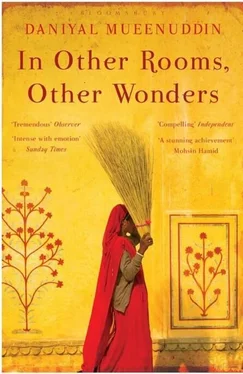‘Is Bibi gone?’
‘They announced lunch.’
‘May I sit down?’
He moved over.
‘It’s amazing. My village would fit in a corner of this garden, and we were thirty families. And it’s so clean and comfortable, out here in the middle of nowhere.’
‘Harouni Sahib is a lord, and we’re poor people. And then, these are the games that the managers play. The better the house and gardens look, the more comfortable he is, the less Mian Sahib notices the tricks they all get up to on the farms. I don’t know what they’re storing it up for, stealing fertilizer and the water and cheating in the books. In the old days no one dared. Mian Sahib made these people — the fathers ate his salt, and now the sons have forgotten and are eating everything else.’
The fire cracked, the dry mango wood catching hungrily.
She threw a little twig into the fire. ‘At least their bellies are full.’
In the morning she washed Begum Kamila’s clothes, sitting by a faucet outside in the back garden, beside the unused tennis court. Foam on her arms, water splashing onto her bodice from the big orange bucket, she looked up at the trees blowing in the wind, the birds. She was alone. The swaybacked tennis net and the odd chalked lines made the lawn seem expectant, prepared. Last night she had taken a bowl of food quickly into her own room. She heard the men outside around a fire telling stories about the old tough managers and light-fingered servants, now dead, or about happenings on the farm, cattle thefts, dowries. Hassan and Rafik and even the drivers, who had after all been in service fifteen or twenty years, had old friends here.
Churning the clothes in the bucket, squeezing them out, she felt happier perhaps than she ever had been. The April sun had bite, even in the morning, reflecting off the whitewashed walls enclosing this back garden. The earth cooled the soles of her bare feet. Her thoughts ducked in and out of holes, like mice. I’ll avoid him, she thought, settling on this as a way forward, knowing that she would be seeing Rafik at lunch if not before. Her love affairs had been so plainly mercantile transactions that she hadn’t learned to be coquettish. But the little hopeful girl in her awoke now. Spreading the clothes to dry on a long hedge that bordered the tennis court, bright red and white and yellow patches against the healthy green, she sat there alone in the sun until lunchtime, undisturbed except once, by a gardener, who walked past with a can, stooping to water the potted plants arranged next to the building.
At lunch she made the chapattis — no one in the village could do that properly. Hassan came into the big hot kitchen, which had a row of coal-burning hearths set at waist level in one wall, and lifted the covers off the saucepans and casseroles prepared by the farm cook — enough for several dozen people.
‘Hey, boy,’ he said to the gangly farm cook, ‘I’ve never heard of chickens with six legs. I suppose you’re one of those guys — if you cooked a fly you’d keep the breast for yourself. At least you could waft it past your lord and master once.’
He pinched Saleema under her arm as she stood flattening the chapattis between her hands.
‘Here’s where the real meat is.’
He laughed without mirth, a drawn-out wheeze.
The young cook didn’t know what to say. He hadn’t slipped anything away yet, though he certainly planned to.
Rafik stood beside another servant, who was spooning the food into serving dishes. The room had high ceilings and a long wooden table in the middle. In the old times food for scores of people had been cooked here, when the master came on weeks-long hunting trips, with large parties and beaters and guides. Fans that had been broken for years hung down on long pipes, like in a railway station hall.
Saleema had become rigid when Hassan pinched her, raising her shoulders but keeping her eyes on the skillet.
Resting a hand on Hassan’s shoulder, Rafik said, ‘Uncle, why do you bother this poor girl? What has she done to you?’
‘You should ask, what hasn’t she done to me.’Then, after a moment, ‘The hell with it, she’s a virgin ever since she rowed across the river, how’s that? Don’t “Uncle” me, when you’re my own uncle.’
He threw down his apron, and left the kitchen, saying to the village cook, ‘Watch out for Kamila Bibi, young man. Mian Sahib doesn’t care what he eats.’
As he walked past Saleema, carrying a tray of food to the living room, Rafik made a funny stiff face and then winked.
That evening the weather changed. This wasn’t the season for rain, but just before dark the wind from the north had begun to blow across the plain, bending the branches of the rosewood trees like a closed hand running up the trunk to strip off the leaves, throwing in front of it a scattering of crows, which flew sloping and tumbling like scraps of black cotton. The rain spattered and made pocks in the dust, cold as rain is before hail. Then it fell heavily. Rafik had taken the drinks into the living room at seven, as he did every day. The food sat warming over coals, there was nothing further to be done until the bell for dinner rang at eight-thirty. The others were in the verandah of the servants’ sitting area. Saleema leaned against the long table, while across from her Rafik sat on a stool. The dim bulbs with tin shades hanging from the ceiling threw a yellow light which left the corners of the room dark. Neither of them could think of anything to say, and Saleema kept wiping her eyes and her face with her dupatta as if she were hot.
When the rain became hard she said, ‘Come on, let’s go see it come down.’
They walked awkwardly through the empty dining room, which smelled of dust and damp brick, then through an arcade to the back verandah. A single banyan tree stood in the middle of the back lawn, the rain cascading down through its handsbreadth leaves. Saleema leaned against a pillar, Rafik stood next to her, his hands behind his back.
‘God forgive us, there’s going to be a lot of damage to the straw that hasn’t been covered,’ he said.
‘This will even knock down the wheat that hasn’t been cut. Look at how hard it’s coming down.’
She looked over at him, his serious wrinkled face, his stubble. Despite the rain, moths circled around the lamps hanging from the ceiling. She kept bumping her hip against the pillar. Come on, come on , she thought. Finally, he said, ‘Well at least they haven’t started planting the cotton yet.’
She turned, with her back to the pillar. ‘Rafik, we’re both from the village, we know all this.’
He looked over at her quickly. His face seemed hard. She had startled him. Then he did come over.
She put her arms around him. ‘You’re thin,’she said, as if she were pleading, ‘you should eat more,’ exhaling. The water splashed in the gutter spouts. He also pulled her into his body and held her, melted into her, she was almost exactly as tall as him, his thin body and hers muscular and young. He kissed her neck, not like a man kissing a woman, but inexpertly, as if he were kissing a baby. She kept her eyes open, face on his shoulder.
The electricity went, with a sort of crack, night extinguishing the house and the rain-swept garden.
‘Let’s go, little girl,’ he whispered in her ear. ‘They’ll be calling for me.’ In the darkness, with the other servants hurrying to bring lamps and candles, no one noticed when Saleema and Rafik returned to the kitchen.
But the next morning, when the servants were eating their parathas and tea, he came over and sat down next to her, saying nothing, sipping the tea and chewing noisily because of his false teeth, his mouth rotating. So everyone knew. After that he ate his meals next to her, and when they had no duties they went off into the empty back garden and sat talking. But they didn’t make love, or even do more than hold hands.
Читать дальше












